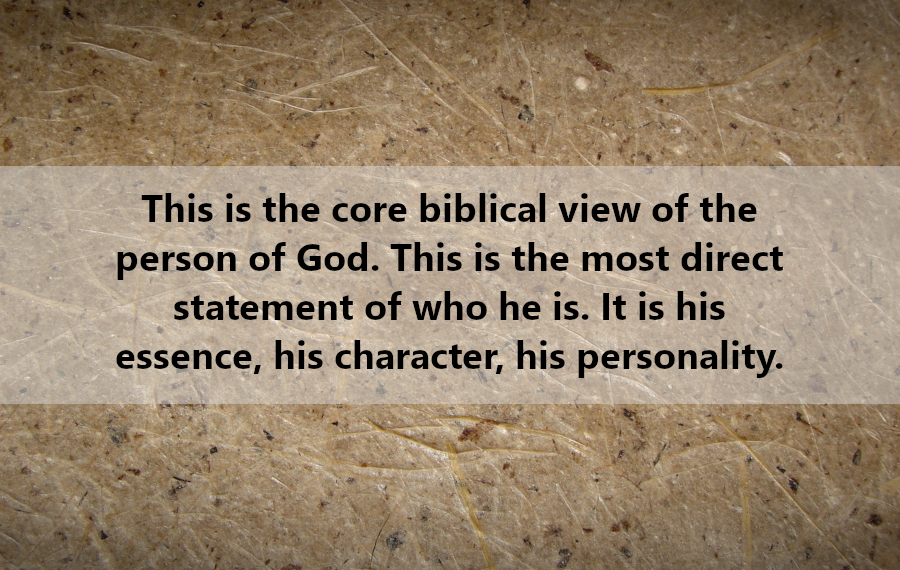When You’re Tempted to Hate People, Part 2: How God Describes Himself
Image

As we’ve noted, even Jonah the bigot knew that God had revealed himself as a God of compassion, who extends mercy even to the most wicked, upon their repentance—and who seeks that repentance from them.
When and where did God reveal this?
It begins with Moses.
He had spent more than a month atop Mt. Sinai, in the very presence of Israel’s God (Ex 24.12-18), receiving the stone tablets containing the commandments God had spoken earlier to the people (Ex 20-23; 31.18). At the end of that remarkable experience, God tells him that the people have corrupted themselves by worshiping a golden bull that they believe represents God himself (Ex 32.7-8), and that God intends to wipe them out and start the nation over with Moses (Ex 32.9-10). Moses argues successfully against that policy by countering that God has promised to build the nation on Abraham (Ex 32.11-14). But when he returns to the foot of the mountain (Ex 32.15) and finds the nation in debauchery, he breaks the stone tablets (Ex 32.19), destroys the bull (Ex 32.20), and brings judgment into the camp (Ex 32.25-28).
As the nation prepares to leave Sinai and travel toward the Promised Land (Ex 33), God prepares Moses to receive a second set of tablets to replace the ones Moses has destroyed (Ex 34.1-4). And there, atop the mountain again, Yahweh reveals himself to Moses with characteristics, attributes, that he has not significantly revealed before. He describes himself as
Yahweh, Yahweh God, compassionate and gracious, slow to anger, and abounding in lovingkindness and truth; 7 who keeps lovingkindness for thousands, who forgives iniquity, transgression and sin; yet He will by no means leave the guilty unpunished, visiting the iniquity of fathers on the children and on the grandchildren to the third and fourth generations (Ex 34.6-7).
This is quite a list. As I said, it’s new revelation; there’s almost nothing said about these things before this point in Scripture. (I’ll specify the “almost” in later posts.) And it becomes a refrain throughout the rest of God’s revelation of himself; it’s clear that he takes it seriously and views the list as a centrally significant part of his relationship with his people. Further, it’s clear that his people recognize that significance, for they bring it up again and again:
- When Israel reacts in fear to the inhabitants of the Promised Land (Num 13.32-33), disbelieving God’s sure promise to Abraham and to Isaac and to all Isaac’s descendants since, wishing that they had never left Egypt (Num 14.1-4)—saying that bondslavery to the Egyptians was better than serving God!—Moses again intercedes for them (Num 14.11-16) by quoting God’s self-description back to him (Num 14.17-19), thereby rescuing them once again from obliteration (Num 14.20).
- David the psalmist rejoices in this self-description of God, 500 years after it was originally spoken, by reciting it and then expanding on it in lyrical meditation (Ps 103.8-14)—more than once (Ps 86.15; 145.8).
- More than 500 years after David, the chorus rises again, this time from the Jews who have returned from captivity in Babylon. Under Nehemiah’s leadership, they cleanse themselves and the Levitical priesthood, issuing forth in a psalm of praise to God (Neh 9.5-38) that includes the ancient self-description (Neh 9.17)—again, more than once (Neh 9.31-32).
- The prophets too pick up the refrain; between David and Nehemiah, Joel weaves the refrain into his call for Judah’s repentance (Joel 2.13); and as we’ve noted, in far-off Nineveh Jonah recalls the verse, in frustration and anger over God’s willingness to accept the repentance of the deservedly hated Assyrians (Jon 4.2).
So this is a big deal. God takes it seriously, and so do his people, even when, as in the case of Jonah, they wish it weren’t so.
We might say that this is the core biblical view of the person of God. This is the most direct statement of who he is. It is his essence, his character, his personality.
Well, then. If our whole purpose is to know God—which is a necessary prerequisite to the Greatest Commandment, to love him (Mt 22.35-40)—then we’d better understand it.
That’s worth a few posts, don’t you think?
Dan Olinger Articles
Reposted with permission from Danolinger.com.
Dan Olinger Bio
Dr. Dan Olinger retired in 2025 after teaching at Bob Jones University for more than two decades, following 19 years as a writer, editor, and supervisor at BJU Press. He taught theology, New Testament, and Old Testament, with special interests in ecclesiology and the Pauline Epistles.
- 291 views


Discussion